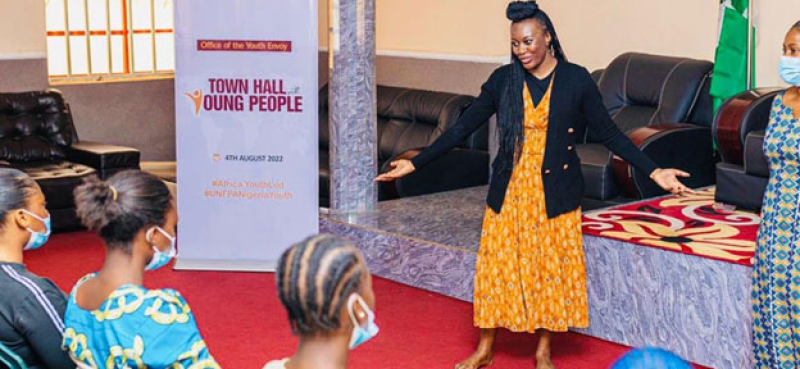- Intimidation or bloodshed cannot halt Bangladesh’s march to democracy |
- Khaleda Zia integral to an important chapter in BD history: Yunus |
- Enthusiasm marks Victory Day celebrations across Bangladesh |
- Dhaka-Delhi ties deep; to be shaped by trust, dignity, mutual respect |
- EU deploys election observation mission to Bangladesh |
Africa's Future Rises with Youth and Women in Leadership

Chido Mpemba at a townhall meeting. Credit: Victor Audu/Office of the Youth Envoy
History rarely remembers those who waited quietly. In Africa, it is those who dare to act, resist, lead, and dream aloud who have shaped the continent’s most defining moments.
As we marked Africa Day 2025 last week (May 25), under the African Union’s theme “Justice for Africans and People of African Descent Through Reparations”, we are reminded that justice is not a destination—it is a continuous pursuit of truth, dignity, and leadership that reflects the realities of our people.
Now more than ever, that pursuit must be inclusive.
The Africa We Want, as envisioned in Agenda 2063, cannot be built without the full power of its majority: its women and youth. Yet these very groups—bearers of innovation and agents of transformation—remain disproportionately underrepresented, underfunded, and undervalued.
Statistically, Africa is both young and female. Over 60% of the population is under 25, and women make up more than half the continent, according to UNFPA’s World Population report. Yet in 2024, only seven African countries had parliaments with more than 35% female representation. Youth-led initiatives still receive less than 1% of global development financing.
Across many member states, youth are excluded from policy co-creation. This isn’t accidental. It is a legacy of a history that centralised power in the hands of a few and deferred progress to a distant future.
But even history has its rebels.
African women like Funmilayo Ransome-Kuti, Albertina Sisulu, Miriam Makeba, and Wangari Maathai redefined protest, politics, and planetary care. These were not just cultural icons—they were architects of resistance.
In post-independence Africa, women didn’t wait for a seat at the table—they built their own. They organised, campaigned, and led long before “gender parity” appeared in policy documents.
At the multilateral level, African women have also broken barriers. Amina J. Mohammed, the second African woman to serve as UN Deputy Secretary-General after Asha-Rose Migiro, reshaped the global narrative. At the AU, Nkosazana Dlamini-Zuma became the first female Chairperson of the AU Commission, setting a benchmark for gender parity that still guides AU leadership structures.
In politics, the story is equally inspiring. Ellen Johnson Sirleaf, Africa’s first elected female president, not only led Liberia but ignited a movement. Through the African Women Leaders Network (AWLN), she helped redefine leadership from exceptional to essential for women.
Since then, countries like Ethiopia, Tanzania, Central African Republic, Mauritius, and Namibia have seen women rise to the highest offices, ushering in a new normal—one that includes all of us.
Yet leadership is not just about holding high office. It is about shifting mindsets.
Bineta Diop, former AU Special Envoy on Women, Peace and Security, embodied this shift. Her leadership in championing the Convention on Ending Violence Against Women and Girls in Africa—a landmark policy recently adopted by AU member states—centred women's safety as a continental priority. True reparation requires safety, freedom, and dignity.
This vision is being echoed by the newly elected AU Commission Chairperson, Mahmoud Youssouf. A father of six daughters, he has openly championed the rights of girls and young women. His leadership style—centred on fairness, generational inclusion, and institutional reform—signals a fresh era at the AU, one more in tune with the aspirations of everyday Africans.
Meanwhile, young Africans are rising—boldly, loudly, and effectively. From climate action in the Sahel to tech innovation hubs in Kigali and Nairobi, they are not waiting for permission to lead.
Digitally fluent, socially conscious, and politically engaged, Africa’s youth are demanding more than just tokenism. They want access. They want capital. They want power.
To meet this moment, we need more than panels and promises—we need structural reform. That includes:
-
Youth quotas in public office
-
Direct funding for grassroots, youth-, and women-led organisations
-
Redefining leadership as a journey that begins with access, mentorship, and vision
We must also acknowledge that reparations are not only about righting past wrongs—but about restoring the future that systemic exclusion has stolen. That includes economic, political, and social space denied to youth and women.
If we are serious about justice for Africans and people of African descent, we must be serious about redistributing opportunity and power.
As we reflect on Africa Day, let us move beyond celebration. Let us reclaim our history, our voices, and our leadership. Let us build a continent where girls can lead revolutions, youth can set national agendas, and justice is tangible.
We are not waiting to be included.
We are here to transform.
—
Chido Mpemba, formerly the African Union Special Envoy on Youth, is now the Special Advisor on Youth and Women to the Chairperson of the African Union Commission.
Source: Africa Renewal, United Nations

